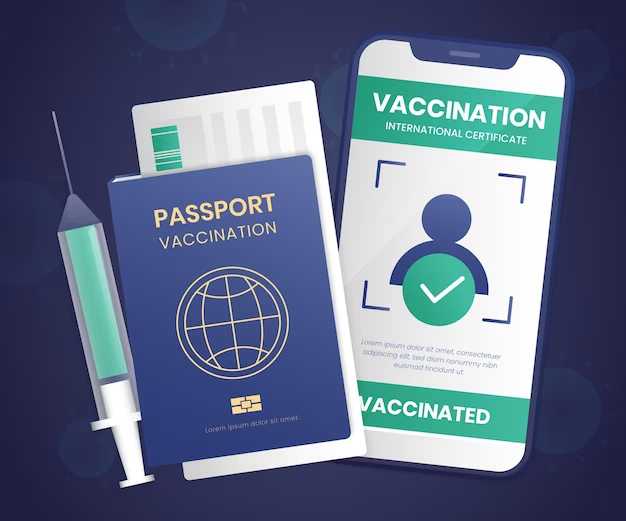The Evolution and Purpose of Vaccination Certificates
Vaccine certificates are not a novel concept; they have been used long before the COVID-19 pandemic to endorse individuals’ immunity against diseases like yellow fever. However, the scope and scale of COVID-19 vaccinations have led to an unprecedented expansion in the use and acceptance of such certificates. Initially, vaccination certificates were a testament to one’s willingness and civic responsibility to participate in the global battle against the pandemic. They served as a crucial screening tool, enabling the identification of immunized individuals for the purposes of work, travel, and social activities.
Implementation and Variability of Vaccine Certificates Globally
Nations worldwide implemented vaccine certificates with varying degrees of regulatory frameworks. In certain countries, the certificates rapidly became a standard prerequisite for entry into entertainment venues, restaurants, and public events, while others adopted a more voluntary approach. This disparity showcased contrasting philosophies and strategies towards COVID-19 vaccinations, balancing privacy concerns with public health needs.
Integration and Technology Behind Vaccine Certificates
The technological framework supporting the creation and verification of vaccine certificates has evolved rapidly. QR codes and digital apps emerged as the primary means for individuals to display their vaccination status. Such advancements brought about ease of use, but also raised questions regarding data privacy and security. Nonetheless, these digital tools enabled the efficient flow of people within and across borders, marking a significant milestone in the fight against COVID.

Economic and Social Impact on Travel and Commerce
The introduction of vaccine certificates has had a profound impact on the travel industry, catalyzing a slow but steady recovery after months of stasis. Countries dependent on tourism began to require evidence of COVID-19 vaccinations from travelers, facilitating safer and more regulated movement of people. However, this requirement also resulted in a complex web of travel regulations, as each country’s vaccine certificates had differing standards and recognition.
Public Opinion and the Debate over Civil Liberties
Public reception of vaccine certificates has varied greatly, with some viewing them as a necessary measure to ensure the greater good, and others perceiving them as an infringement on personal freedoms. Debates over the certificates have highlighted the tension between collective health security and individual rights, with widespread discourse on how the use of such measures could or should be limited to respect civil liberties.
To better understand how vaccine certificates have been integrated worldwide, let’s examine the following numbered lists:
- Modes of Presentation for Vaccine Certificates:
- Digital applications with QR codes
- Physical paper documentation
- Smart cards with embedded chips
- Criteria for Obtaining a Vaccine Certificate:
- Completion of the full vaccination regimen
- Proof of a recent negative COVID-19 test result
- Recovery from COVID-19, confirmed by a healthcare provider
Additionally, to illustrate the global use and acceptance of vaccine certificates, consider the table below showcasing a comparison of three different countries’ approaches to vaccination certifications:
| Country | Vaccine Certificate Name | Usage in Domestic Settings | Usage for International Travel | Recognition of Foreign Certificates |
|---|---|---|---|---|
| United States | COVID-19 Vaccination Card | Limited | Required for entry from specific countries | Partial recognition |
| European Union | EU Digital COVID Certificate | Extensive | Streamlined travel across EU member states | Broad recognition within EU, selective outside |
| Japan | Vaccine Passport | Minimal | Required for reduced quarantine measures | Recognized by select partner countries |
Accessibility and Equality Issues
The widespread use of vaccine certificates has raised concerns about equality and accessibility. Not all populations have equal access to vaccines or the technology required for digital certificates, leading to a potential divide where certain individuals may be marginalized. For instance, in remote or impoverished regions, residents may find it challenging to receive vaccinations or lack the digital infrastructure to easily demonstrate their vaccine status. International bodies and human rights organizations have highlighted the need for equitable vaccine distribution and certificate accessibility to prevent exacerbating existing social and health inequalities.
Future Developments and Adjustments to Vaccine Certificates
As the world continues to adapt to the COVID-19 pandemic, the conversation around vaccine certificates is also evolving. Governments and health organizations are working to update these documents to account for booster shots, the emergence of new variants, and changes in vaccine efficacy. The potential for standardization at a global level is also a topic of discussion, as it could facilitate international travel and commerce. Furthermore, the degree to which vaccine certificates will remain a part of our societal infrastructure post-pandemic remains an open question, contingent on the path the virus and its variants take.

The Role of Vaccine Certificates in Health Policy
Vaccine certificates have become a pivotal aspect of public health policy, providing a mechanism for health departments to track vaccination progress and issue guidelines for safety measures. They have enabled fine-tuning of local health interventions, such as targeted lockdowns or the easing of restrictions in areas with high vaccination rates. Policy decision-makers are now accustomed to leveraging the data gleaned from vaccination certificates to inform their strategies and promote safe public health practices.
Legal and Ethical Considerations
The implementation of vaccine certificates has sparked legal and ethical debates across jurisdictions. Concerns revolve around the protection of personal health data, the potential for mandatory vaccine policies, and the repercussions for those who are unwilling or unable to comply. Lawyers and ethicists are examining how these certificates intersect with existing laws and frameworks for personal freedom, with legal challenges emerging in various courts that could set precedents for their future use.
Public Health Outcomes and Success Stories
In regions where vaccine certificates have been widely adopted and integrated into daily life, there have been noted successes in controlling the spread of COVID-19. These certificates have encouraged vaccination uptake, facilitated the safe reopening of economies, and allowed for a degree of normalcy in social interactions. By reviewing these success stories, other regions may learn and adopt best practices in their own public health strategies, tailoring the use of vaccine certificates to their unique circumstances.
To delve further into specific aspects, here are two numbered lists that detail the pros and cons of vaccine certificates:
Pros of Vaccine Certificates:
- Provide a boost to the economy by enabling safer travel and commerce.
- Encourage higher vaccination rates as a pathway to restored freedoms.
- Allow for real-time health monitoring and tailored public health policies.
- Facilitate international cooperation by standardizing health documentation.
- Offer reassurance to individuals engaging in social activities and events.
Cons of Vaccine Certificates:
- Potentially deepen divides based on vaccine access and digital literacy.
- Trigger ethical and legal concerns over privacy and personal choice.
- Create complex new bureaucracies and systems for certification.
- Result in inconsistent application and recognition between different jurisdictions.
- Risk becoming obsolete with changing pandemic dynamics and vaccine updates.

Conclusion
Registering a vaccination certificate issued in another country is an essential step towards ensuring the recognition of your vaccination status in your country of residence. While the process may vary depending on local regulations and procedures, it typically involves providing necessary documents, following specific steps outlined by the authorities, and seeking assistance if encountering any difficulties.
By following the guidelines provided by the relevant authorities and staying informed about the requirements, you can successfully register your vaccination certificate and contribute to the global efforts in combating the spread of infectious diseases.
Remember to always check for updates and stay compliant with the latest regulations to ensure a smooth registration process.
Thank you for taking the necessary steps to register your vaccination certificate and for playing your part in safeguarding public health.
FAQ:
1. Can I register a vaccination certificate issued in another country?
Yes, in many cases you can register a vaccination certificate issued in another country, depending on the regulations and procedures of your country of residence.
2. What documents do I need to register a vaccination certificate from another country?
The required documents may vary depending on your country’s regulations, but typically you’ll need your vaccination certificate, identification documents, and possibly additional forms or declarations.
3. How do I start the registration process?
To start the registration process, you’ll need to contact the relevant authorities or visit their official website to find information about the specific procedures and requirements for registering a vaccination certificate from another country.
4. Are there any specific steps I need to follow?
Yes, there may be specific steps you need to follow, such as filling out an online form, providing copies of your documents, scheduling an appointment, or undergoing additional verification processes.
5. What should I do if I encounter difficulties during the registration process?
If you encounter difficulties during the registration process, you should reach out to the appropriate authorities for assistance. They can provide guidance and support to help you complete the registration successfully.
